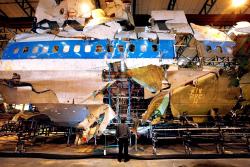
Published date
21 January 1990
Nelson Mandela issued a statement condemning the Lockerbie bombing and loss of life that occurred as a result. The bombing killed all 243 passengers, 16 crew and 11 people on the ground. He also proposed dealing with the issue in a way that would avoid confrontation and sustain peace and stability. It was the first mass killing of Americans by terrorists.
Mandela proposed different approaches to dealing with the issue: "If no extradition treaty exists between the countries concerned, it must be conducted in the country where the accused were arrested. Alternatively, the trial should be conducted in a neutral country by independent judges, or The Hague by an international court of justice."
After the bombing, Western leaders avoided visiting Libya as sanctions were imposed on the country for refusing to hand over suspects of the 1988 bombing in 1991. In 1997, after the fall of apartheid, Nelson Mandela, accompanied by Graça Machel and Minister of Foreign Affairs Alfred Nzo, defied the international isolation of Libya and visited Libyan leader Muammar Gaddafi. Mandela defied criticism from the United States of America to meet Gaddafi.
In 1999, Mandela successfully mediated in a long standing dispute between Gaddafi and the West. Part of the compromise reached was that the United Nations would not press criminal charges against Gaddafi, provided Gaddafi accepted civil responsibility for the Lockerbie bombing and handed over the suspects to the international court. The deal saw Libya handover suspects of the Lockerbie bombing for trial in the Netherlands.
Mandela proposed different approaches to dealing with the issue: "If no extradition treaty exists between the countries concerned, it must be conducted in the country where the accused were arrested. Alternatively, the trial should be conducted in a neutral country by independent judges, or The Hague by an international court of justice."
After the bombing, Western leaders avoided visiting Libya as sanctions were imposed on the country for refusing to hand over suspects of the 1988 bombing in 1991. In 1997, after the fall of apartheid, Nelson Mandela, accompanied by Graça Machel and Minister of Foreign Affairs Alfred Nzo, defied the international isolation of Libya and visited Libyan leader Muammar Gaddafi. Mandela defied criticism from the United States of America to meet Gaddafi.
In 1999, Mandela successfully mediated in a long standing dispute between Gaddafi and the West. Part of the compromise reached was that the United Nations would not press criminal charges against Gaddafi, provided Gaddafi accepted civil responsibility for the Lockerbie bombing and handed over the suspects to the international court. The deal saw Libya handover suspects of the Lockerbie bombing for trial in the Netherlands.
References
SAHO, Nelson Mandela's statement on the Lockerbie disaster, from South African History Online, [online] Available at www.sahistory.org.za [Accessed: 12 January 2011]|Anon, (1997), Despite U.N. Ban, Mandela Meets Qaddafi in Libya October 23, from the New York Times, [online] Available at www.nytimes.com [Accessed: 12 January 2011]|Anon, (1997), 'Nelson Mandela visits Libya, embraces Moammar Gadhafi' , 22 October, from Cable News Network (CNN), [online] Available at www.cnn.com [Accessed: 12 January 2011]